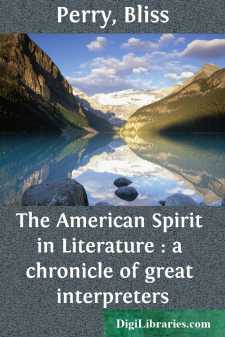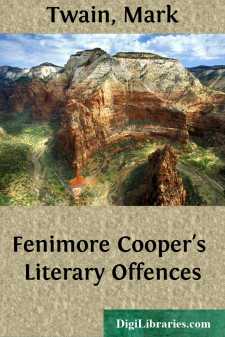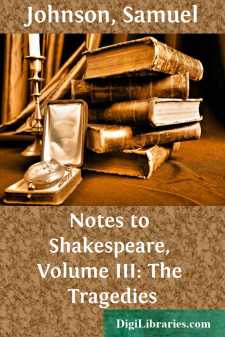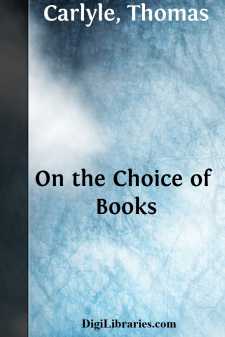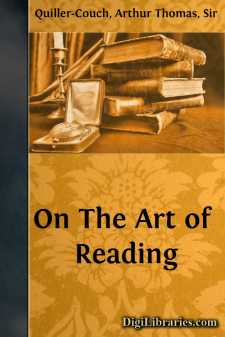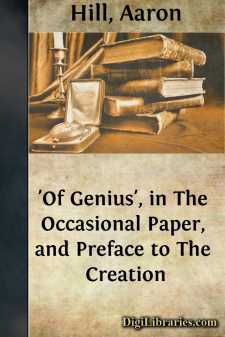Literary Criticism
- American 18
- Ancient and Classical 3
- Asian 1
- Australian & Oceanian 1
- Books & Reading 8
- Caribbean & Latin American 2
- Drama 2
- English, Irish, Scottish, Welsh 49
- European 7
- General 37
- Horror 1
- Humor 2
- Jewish 2
- Medieval 2
- Middle Eastern 3
- Poetry 7
- Renaissance 6
- Russian & Former Soviet Union 1
- Shakespeare 27
Literary Criticism Books
Sort by:
by:
Bliss Perry
CHAPTER I. THE PIONEERS The United States of America has been from the beginning in a perpetual change. The physical and mental restlessness of the American and the temporary nature of many of his arrangements are largely due to the experimental character of the exploration and development of this continent. The new energies released by the settlement of the colonies were indeed guided by stern...
more...
by:
Mark Twain
It seems to me that it was far from right for the Professor of English Literature in Yale, the Professor of English Literature in Columbia, and Wilkie Collins to deliver opinions on Cooper's literature without having read some of it. It would have been much more decorous to keep silent and let persons talk who have read Cooper. Cooper's art has some defects. In one place in...
more...
I think that every man ought to work for his living, without exception, and that when he has once avouched his willingness to work, society should provide him with work and warrant him a living. I do not think any man ought to live by an art. A man's art should be his privilege, when he has proven his fitness to exercise it, and has otherwise earned his daily bread; and its results should be free...
more...
by:
Bliss Perry
I Race, Nation, and Book Many years ago, as a student in a foreign university, I remember attacking, with the complacency of youth, a German history of the English drama, in six volumes. I lost courage long before the author reached the age of Elizabeth, but I still recall the subject of the opening chapter: it was devoted to the physical geography of Great Britain. Writing, as the good German...
more...
by:
Samuel Johnson
TRAGEDIES Vol. IV (392) Most of the notes which the present editor has subjoined to this play were published by him in a small pamphlet in 1745. I.i (393,*) Enter three Witches] In order to make a true estimate of the abilities and merit of a writer, it it always necessary to examine the genius of his age, and the opinions of his contemporaries. A poet who should now make the whole action of his...
more...
by:
Emily Hickey
The beginnings of Literature in England. Two poets of the best period of our old poetry, Caedmon and Cynewulf. The language they wrote in. The monastery at Whitby. The story of Caedmon's gift of song.How many of us I wonder, realise in anything like its full extent the beauty and the glory of our Catholic heritage. Do we think how the Great Mother, the keeper of truth, the guardian of beauty, the...
more...
by:
Thomas Carlyle
BIOGRAPHICAL INTRODUCTION. There comes a time in the career of every man of genius who has devoted a long life to the instruction and enlightenment of his fellow-creatures, when he receives before his death all the honours paid by posterity. Thus when a great essayist or historian lives to attain a classic and world-wide fame, his own biography becomes as interesting to the public as those he himself...
more...
LECTURE I INTRODUCTORY WEDNESDAY, OCTOBER 25, 1916 I In the third book of the "Ethics", and in the second chapter, Aristotle, dealing with certain actions which, though bad in themselves, admit of pity and forgiveness because they were committed involuntarily, through ignorance, instances 'the man who did not know a subject was forbidden, like Aeschylus with the Mysteries,' and...
more...
by:
Aaron Hill
INTRODUCTION The anonymous essay "Of Genius," which appeared in the Occasional Paper of 1719, still considers "genius" largely a matter of aptitude or talent, and applies the term to the "mechanick" as well as the fine arts. The work is, in fact, essentially a pamphlet on education. The author's main concern is training, and study, and conscious endeavor. Naturally enough,...
more...
INTRODUCTION Gay's concern in his survey of The Present State of Wit is with the productions of wit which were circulating among the coffee-houses of 1711, specifically the large numbers of periodical essays which were perhaps the most distinctive kind of "wit" produced in the "four last years" of Queen Anne's reign. His little pamphlet makes no pretence at an analysis of true...
more...


